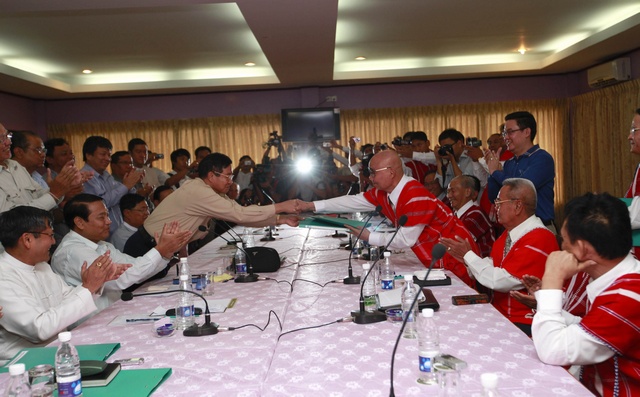The politically ambitious always have one eye on the task at hand and another on upcoming elections, even if they’re years away. With Burma’s nascent political developments unfolding, certainly there are those who have the 2015 general elections on the brain.
Famed opposition leader Aung San Suu Kyi has spent most of her time campaigning across the country for the National League for Democracy’s candidates, rather than canvassing in the township south of Rangoon that she hopes to represent come April. While 48 seats might be the only vacancies on the table now, the general elections in three years may allow for a larger political harvest for those who sow their seeds early enough.
Certainly, Suu Kyi’s popularity has kept her in headlines across the globe. But who else is nurturing ambitions that might offer dividends later on down the line?
Burma’s parliament yesterday said it will increase wages for civil service workers and members of the country’s armed forces that could see some earning twice their current salaries. The pay hike is due to come into effect on 1 April, and those targeted will receive an additional 30,000 kyat ($US37.50) each month.
The announcement said the rise would “help the livelihood” of those targeted, after parliamentary speaker Shwe Mann, who the New York Times says “has been very vocal in pushing for accelerated democratization”, warned that salaries were not enough to cover “basic daily expenses”. Staff were supplementing in ways that would damage their “character”, he said.
Poor salaries, particularly in the army, have contributed to official complicity in criminal activities: the lowest-ranking troops earn little more than $US10 per month and are forced to provide their own food, meaning many soldiers are tempted into facilitating Burma’s lucrative drugs trade. Does the former Joint Chief of Staff of Burma’s military have earnest intentions, or are these crafted moves that may come in handy in a future election campaign?
Another potential future star is the country’s Rail Transportation Minister, Aung Min. Last week the minister, who has already made headlines thanks to his participation in helping to seal several ceasefire agreements with armed ethnic groups, agreed to cut 5.5 billion kyat ($US6.7 million) from his ministry’s budget to help allocate funds for the civil servant pay rise.
The legislative moves follow in the wake of a report submitted to parliament by the Union Auditor General’s Office (UAGO) that accuses six government ministries – energy, agriculture, mining, cooperatives, information and industry – of misappropriating billions of kyat and submitting false financial statements. That finding was made after Shwe Mann had called for an audit of the ministries to locate available funds to support the pay rise.
With the absence of rule of law, many of Burma’s recent reforms remain fragile. However, if the country is serious about becoming more democratic, certainly Shwe Mann and Aung Min are making a case that they have the ability to get things done – political capital that can be cashed in if they’re willing and remain able.



